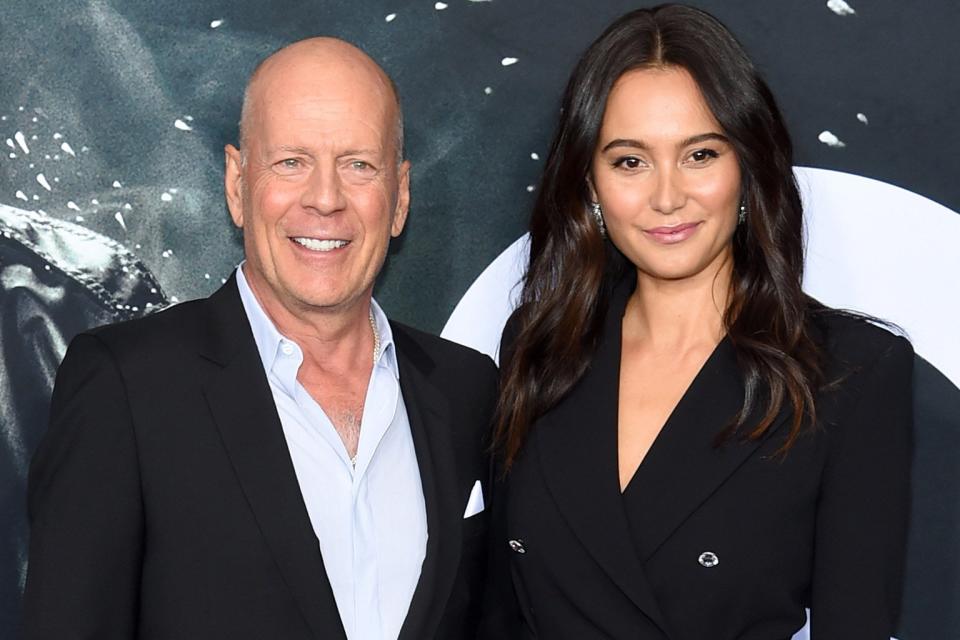Emma Heming Willis Attends First FTD Fundraiser Following Bruce Willis' Dementia Diagnosis: 'Join the Cause'

- Oops!Something went wrong.Please try again later.
Sean Zanni/Getty
Emma Heming Willis is continuing her advocacy work for her husband Bruce Willis after he was diagnosed with frontotemporal dementia.
On Tuesday, the 44-year-old attended the seventh annual AFTD's Hope Rising Benefit in New York City. The charity gala raised money in support of the organization's work to support those affected by the disease.
Emma posed alongside Vogue Editor in Chief Anna Wintour on the red carpet for the benefit, which garnered more than $1.8 million. Following the event, she posted a recap video of her time on Instagram.
"Hope was indeed rising in our FTD (frontotemporal dementia) community last night in New York," she wrote. "Thank you for welcoming me @theaftd to my new home. It's not the room I ever dreamed of being in but let me tell you, it's a room of fierce love and resilience. I'm here to join the cause alongside all of you."
She added, "If you are in need of FTD support, please lean on @theaftd as they have been an invaluable resource to myself and family on this journey ❤️ #hoperising2023 #endftd #ftdawareness."
The fundraiser comes just a week after Emma publicly vowed to raise awareness about FTD.
The mom of two shared a photo on Instagram with dementia care and education specialist Teepa Snow. While tagging the Association for Frontotemporal Degeneration, Emma praised the help she's received so far while learning how to navigate Bruce's condition.
"I'm grateful I had the opportunity to work with @teepasnows_pac who has helped me add to my dementia care toolbox," she wrote. "She's a loving, compassionate and skilled leader in this space who navigates herself with pure empathy. She's a gift. Head to the link in my bio as her website has a wealth of caregiving information you might find useful too 💌 #dementiaawareness #ftdawarness #EndFTD #EveryFTDStoryCounts."
"@emmahemingwillis has done an absolutely remarkable job of providing the right support for Bruce as his abilities have changed and created a place, space and life that continues to provide him with what he needs to live well," Snow replied in the comments. "Frontotemporal dementia is never easy but with the right programming and support, it truly is possible to continue living life. Congrats to Emma and their entire family for their very very hard work and dedication. It is truly remarkable!"
RELATED: What Is Frontotemporal Dementia? Everything to Know About Bruce Willis' Diagnosis

Jamie McCarthy/Getty Bruce Willis and Emma Heming Willis
Emma revealed last month that Bruce was diagnosed with frontotemporal dementia, sharing that his condition has worsened since his family first shared news of his aphasia diagnosis last year.
"Unfortunately, challenges with communication are just one symptom of the disease Bruce faces. While this is painful, it is a relief to finally have a clear diagnosis," she said at the time.
Emma added in her full statement, "Bruce always believed in using his voice in the world to help others, and to raise awareness about important issues both publicly and privately. We know in our hearts that – if he could today — he would want to respond by bringing global attention and a connectedness with those who are also dealing with this debilitating disease and how it impacts so many individuals and their families."
Frontotemporal dementia is an all-encompassing term for a group of brain disorders that threatens the frontal and temporal lobes of the brain. This means that parts of these lobes atrophy, and the shrinking of these areas can cause speech issues, emotional problems and changes in personality.
Other symptoms can include loss of motor skills — problems walking, swallowing or muscle spasms. Symptoms tend to get worse over time. Patients typically begin to notice symptoms between 40 - 65 years of age, but it can affect people who are younger. It is the most common form of dementia for people under 60.

